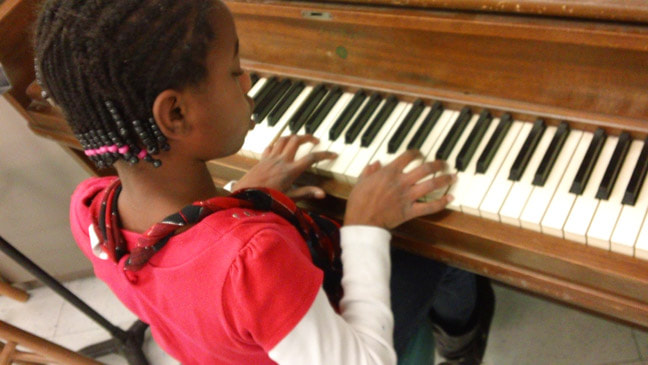“And whatever you do, don't let those kids play that piano! All they do is hit it!”
Those were the parting words from a music teacher who was leaving a school I had just been assigned. The school enrollment was somewhere between 600 and 700 students. It was a Title 1 School.
My preliminary assessments showed that a very small portion of the school had ever touched a piano or guitar before. Many kids, when given the opportunity to play the piano, approached it with their hands clenched, thumbs up, and trying to text notes as if they were using a cell phone.
It became obvious that they had not been in a room with someone who could actually play songs on the piano so for several weeks, they got to watch and listen to me play. I made eight and a half by eleven sheets with a single octave piano keyboard landscape wise. I gave each child two sheets so that they could have a left-hand and right-hand and pretend to play. I would ask them to watch my hands and try and copy what I did.
I gave them immense praise for those who mimicked me the best and soon everyone was catching on.
Their paper piano playing was making me smile and yell words praise that they were unused to seeing or hearing from their music teacher.
The script I wrote for that moment was as follows:
“When you respect the piano, the piano will respect you and make you sound like a thoughtful musician. When you disrespect the piano, bang on the keys with a fist, you are hitting the piano and it will make you sound like a fool.
It's just like it is with people, with the people you know and meet.
When we talk to one another, when we can make music with our words and logic, we make ourselves and our friends smarter. But when we use our fists to hit one another, we are showing disrespect not just to the person we're hitting but also to ourselves and that only brings shame.”
Eventually that room had over 20 pianos in it and I'm happy to report that no one ever hit a piano.
Those were the parting words from a music teacher who was leaving a school I had just been assigned. The school enrollment was somewhere between 600 and 700 students. It was a Title 1 School.
My preliminary assessments showed that a very small portion of the school had ever touched a piano or guitar before. Many kids, when given the opportunity to play the piano, approached it with their hands clenched, thumbs up, and trying to text notes as if they were using a cell phone.
It became obvious that they had not been in a room with someone who could actually play songs on the piano so for several weeks, they got to watch and listen to me play. I made eight and a half by eleven sheets with a single octave piano keyboard landscape wise. I gave each child two sheets so that they could have a left-hand and right-hand and pretend to play. I would ask them to watch my hands and try and copy what I did.
I gave them immense praise for those who mimicked me the best and soon everyone was catching on.
Their paper piano playing was making me smile and yell words praise that they were unused to seeing or hearing from their music teacher.
The script I wrote for that moment was as follows:
“When you respect the piano, the piano will respect you and make you sound like a thoughtful musician. When you disrespect the piano, bang on the keys with a fist, you are hitting the piano and it will make you sound like a fool.
It's just like it is with people, with the people you know and meet.
When we talk to one another, when we can make music with our words and logic, we make ourselves and our friends smarter. But when we use our fists to hit one another, we are showing disrespect not just to the person we're hitting but also to ourselves and that only brings shame.”
Eventually that room had over 20 pianos in it and I'm happy to report that no one ever hit a piano.

 RSS Feed
RSS Feed